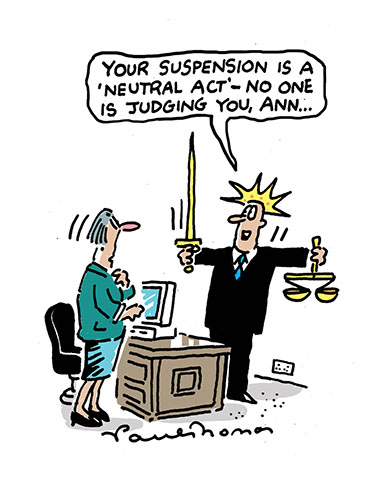Surviving suspension
Suspension can damage your career but doesn’t have to be a disaster. We explain how to limit the damage and improve your chances of a successful return to work.

1. Suspension is supposed to be neutral
If you’re suspended, it’s common to hear that suspension isn’t a punishment and doesn’t imply guilt – it’s a ‘neutral act’ that allows your employer to investigate what’s happened. In reality, it doesn’t feel at all neutral if you’re on the receiving end, and your absence will soon give rise to rumour among your colleagues. For senior managers especially, the risk of reputational damage – even if exonerated – is high.
2. Know the legal position
In recent years, the courts have challenged the notion that suspension is a ‘neutral act’. In Mezey vs South West London and St George’s Mental Health Trust (2007), the Supreme Court ruled that “suspension changes the status quo from work to no work, and inevitably casts a shadow over the employee’s competence”. The ruling doesn’t stop employers from suspending staff, but it does leave them vulnerable to claims for constructive dismissal if they can’t show why suspension is justified.
3. Suspension must be justified
Your employer shouldn’t suspend you just because someone has made an accusation against you. You may have a legitimate grievance if they haven’t considered whether your presence at work would prejudice the investigation or damage the organisation in some way. Your employer must have grounds for believing that you would interfere with the investigation and show that they have properly considered alternatives to suspension.
4. Suspension shouldn’t be the first resort
In another important case, Agoreyo vs London Borough of Lambeth (2017), the Queen’s Bench Division said that employers “need to avoid a ‘knee jerk’ reaction, with suspension as the default position without consideration of the alternatives”. In this case, the court considered such factors as how quickly the decision was made, who made it, whether your point of view was properly heard and whether it was possible to carry out the investigation without suspension.
5. Avoiding suspension is usually better all round
Suspension can damage your career and reputation, and be costly and disruptive to the organisation itself. Wherever possible, MiP will press your employers to let you return to work during the investigation, with changes to your responsibilities or workplace if necessary. Investigations can drag on, and avoiding suspension reduces disruption all round.
6. You may be left in the dark
While MiP will press your employer for as much information as possible, you may not get full details of the allegations against you at the start. Discuss your case fully and frankly with your national officer and gather evidence for all eventualities – for example, by writing your own account of any incidents that may be relevant.
7. Act fast to protect your career
Long suspensions can reduce your chances of getting another job if you do end up having to leave. So it’s important to act fast to challenge your suspension or at least keep your time away from the job as brief as possible. Before doing anything else, speak to your MiP national officer so they can advise you on your first response.
8. Going public is risky
It’s important to comply with any instructions not to contact colleagues or talk to them about the allegations against you. Always consult with MiP before going public – it’s a high-risk strategy that often just raises the stakes. If you want to challenge wrongdoing in your organisation, always follow the whistleblowing procedure, and go through your local Freedom to Speak Up Guardian before raising the issue with regulators such as the CQC or NHS Improvement. Only then, should you even consider speaking to the press or airing your grievances on social media.
9. Employers must follow their own procedures
Your employer will have an agreed policy on handling suspensions and the conduct of disciplinary matters. Go through it with your national officer and make sure your employer follows it to the letter.
10. Decide what you want
Especially if you’re near the top of the organisation, it may be very difficult to return to work after being suspended for any length of time. It may be better to negotiate your departure through a settlement agreement rather than fight a long and damaging case. Try to be realistic about your chances and talk to your national officer about your expectations so they can guide you towards the best outcome for you. .
Ruth Smith is MiP national officer for the North East, Yorkshire and the Humber.
Related News
-

Tipster: How to do your own quarterly review
Executive coach Jane Galloway explains how taking time to reflect on your last quarter can set you up for a brilliant next three months.
-

Tipster: How to manage in a crisis
Leadership coach and former senior detective Andy Cribbin offers his tips for managers on how to prepare for a crisis, manage calmly and deliver results that people will remember.
-

Tipster: How to restart you career after redundancy
Being made redundant or looking for work in later life can be an unsettling experience. Lucy Standing, co-founder of older workers support network Brave Starts, gives her tips on how to explore your options and boost your chances of finding the job you want.